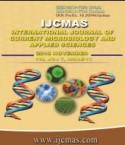


 National Academy of Agricultural Sciences (NAAS)
National Academy of Agricultural Sciences (NAAS)

|
PRINT ISSN : 2319-7692
Online ISSN : 2319-7706 Issues : 12 per year Publisher : Excellent Publishers Email : editorijcmas@gmail.com / submit@ijcmas.com Editor-in-chief: Dr.M.Prakash Index Copernicus ICV 2018: 95.39 NAAS RATING 2020: 5.38 |
In modern agriculture, in view of the rapid progress in newer techniques of cultivation and availability of several options of crop management practices, reliance exclusively on chemical control for insect pest management has not yielded desired returns for the farmer. Integrated pest Management (IPM) became an effective alternative to the use of chemicals. Hence, imparting knowledge on modern technologies to the farmers has become one of the most important mandate of the extension system of India. Capacity building of farmers to update their knowledge and skills in modern agriculture technologies is one of the mandate of KVKs The present study was conducted on evaluating the effectiveness of farmers trainings on Integrated Pest Management (IPM) held at Krishi Vigyan Kendra (KVK), Utukur conducted which is needed for further improvement in their standard. Two variables namely, respondents socio economic status and their knowledge levels about the IPM practices learned in training programme at KVK Utukur were measured by a structured interview schedule to study outcome of the training. The impact was evaluated by knowing the adoption status of IPM practices by the trainees, the problems faced by them in adoption of these practice. A typical trainee was old aged (> 50 years) married male with education level of being illiterate to primary educated, from rural and agricultural background and had a gross monthly income of less than Rs 10,000. Post evaluation scores of gain in overall knowledge about various practices indicate 70-95 % improvement in their knowledge. All the trainees had positive change in the level of knowledge after the training. Adoption status of IPM practices was studied to know the impact of training programmes. It is indicated that 85.8 percent of the trainees had adopted IPM (52.8 % continued and 33 % discontinued) where as 13.2 percent did not adopt. It can be observed that various problems faced by farmers were labour work load in sowing intercrop, non-availability of pheromone traps, non-availability of neem oil and Bacillus thuringiensis (Bt) in pesticide shops, fear of increase in pest population if not sprayed of which majority fear of increase in pest population if not sprayed regularly. We conclude that further promotion on IPM adoption is required to minimize utilization of pesticide and attaining sustainable agricultural production.
 |
 |
 |
 |
 |